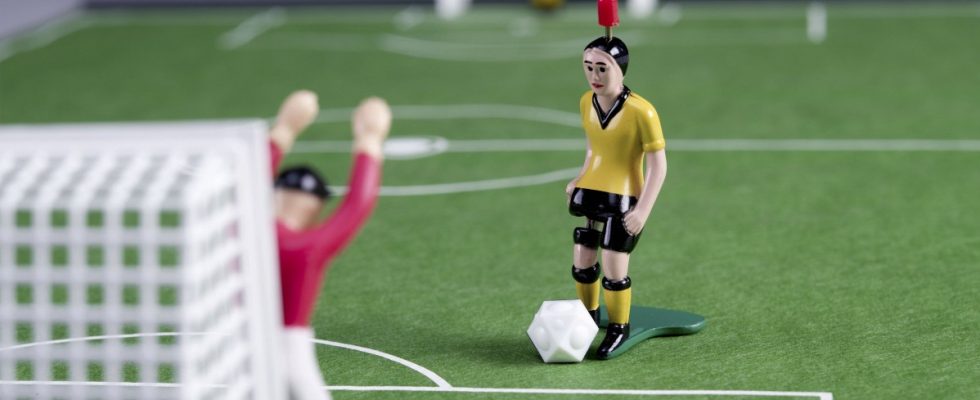The hype surrounding the Darts World Cup has made Aimé Lungela from Hildesheim near Hanover realize “that we don’t have to hide from it.” After all, he and his teammates also need a high level of concentration, trained hand coordination and sophisticated playing technique, patience and tolerance for mistakes as well as stamina and the ability to react. The difference is that the most successful dart throwers now inspire millions of people and collect big prize money. While Lungela and his friends play in gymnasiums in front of manageable backdrops, pay their own travel expenses and are happy about trophies alone. They play tip-kick.
The table football game has been around for 100 years, with a finger-length goalkeeper and a field player as a team. The keeper is stiff and can only be thrown left or right. The fielder has to press a button on his head to make his right leg swing out and kick a ball. The game is played twice for ten minutes, either on a roll-out or a fixed playing field, which in itself separates occasional players from ambitious players. The competitive players are organized in the German Tipp-Kick Association, whose president and national game director is the aforementioned Aimé Lungela. There are a first and two second Tipp-Kick federal leagues, four regional leagues and several association leagues. Tipp-Kick – at least if you can trust the internet videos of tournaments – seems, like darts, to be one of the last men’s bastions.
Darts and Tipp-Kick are equally subject to the latent question of whether they are actually a sport or “just” a game. Tipp-Kick company founder Edwin Mieg had no head for such hair-splitting in Villingen-Schwenningen in 1924, because the beginning was difficult. In 1921 he had a patent from Karl Mayer from Stuttgart for a “football board game with standing figures whose feet can make impact movements”, including a cube-shaped ball with “rounded edges and corners”, whereby “the color shown at the top determines which side comes to the game”. bought. Although the real sport of football was on the rise at the time, it took ten years before Tipp-Kick became a bestseller.
To this day, popularity and economic success depend on the football zeitgeist. In 1954, the year of the Miracle in Bern, Tipp-Kick also sold extremely well, especially since the goalkeeper was called “Toni”, like the real Toni Turek in the World Cup final. But when German national players angered the fans with listless World Cup performances such as against Austria in 1978 in the “Disgrace of Córdoba” or extended middle fingers (Effenberg, 1994), or a bribery scandal was exposed in the Bundesliga, Tipp-Kick was a slow seller. But if a summer football fairy tale swept the country like in 2006, Tipp-Kick sold accordingly.
The now third generation of the Mieg manufacturing family is also hoping for this in 2024. A European Football Championship is coming up in Germany, and Tipp-Kick will be a licensed product from the DFB. Parallel to the European Championships, the open German championships will be played in Villingen-Schwenningen in June, “with definitely more than 100 participants from several countries,” says Aimé Lungela. The players’ skill and luck are accompanied by cheers and boos from fans, and those who want can play national anthems during the matches. Sound modules make it possible. Because after 100 years, digitalization has also affected Kick-Tipp.

